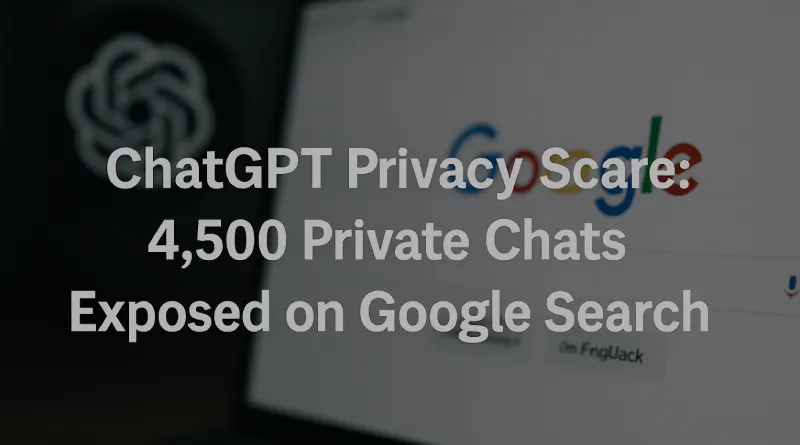ChatGPT Privacy Scare: 4,500 Private Chats Exposed on Google Search
Introduction
Privacy A scandal erupted in OpenAI on July 31, 2025, when more than 4,500 of the private ChatGPT chats containing the name and location of some users were discovered indexed in Google Search. The problem was in the so-called Share option being present until recently, which made the chats publicly accessible. The article explores the case and presents distinctive information and national context to make it India-inspired and useful to follow and act on.
The Privacy Breach: What Happened?
The ability to create public URLs of chat sessions created with ChatGPT, although having a checkbox to opt in to have the conversation streamable through Google, was introduced by OpenAI earlier in 2025 via its Share option. Fast Company indicated that more than 4,500 chat messages were indexed, including sensitive information such as mental health problems, addiction, and professional life problems. The option of making this chat discoverable was deciphered by users incorrectly, which led to the sharing of personal information. Cached versions still remained on Google even after they were deleted, hence raising privacy issues. On X, OpenAI Chief Information Security Officer Dane Stuckey wrote about the removal of the feature due to unintended risks, and the company is currently trying to de-index conversations that took the feature.

Unique Insights: The Perils of AI Trust
It is a perfect example of one of the most serious discrepancies between user expectations and reality on AI platforms. According to a podcast by CEO Sam Altman, many of them use ChatGPT as a confidant and share very personal information. Privacy was the assumed thing, and lack of clarity in feature communication resulted in unintentional revelations. This is why user education and defaults to high privacy must be even tighter in the context of AI tools. The security violation also poses the question regarding the use of AI in such sensitive situations, where despite being users in India and the rest of the world, people will be having second thoughts about sharing personal inquiries for fear of being revealed to others.
Local Context: Implications for India
This privacy lapse is echoed well in India, which has an internet user base of 600 million and has seen the adoption of AI on the rise. Indian users, especially within technologically driven cities such as Bengaluru, use ChatGPTin undertaking education, coding, and business duties. Publication of names and addresses may result in doxxing or bullying, of which the rates are on the increase in such a country (1.3 million cases in 2024). The case is a reflection of the trend in India to strengthen data protection through enacting the Digital Personal Data Protection Act that requires AI platforms to comply with the laws of local jurisdiction.
Conclusion and Recommendations
The fact that OpenAI was quick to remove the feature can be considered a plus, but users should look out. To delete shared chats, go to your ChatGPT Shared Links interface (Settings > Data Controls > Manage Shared Links). Do not provide confidential information, and communicate with AI as being potentially public. In the case of India, this case shows how important AI privacy policies can be. Report extreme leakages to OpenAI and promote data openness in processing.
Disclaimer
The information presented in this blog is derived from publicly available sources for general use, including any cited references. While we strive to mention credible sources whenever possible, Web Techneeq – Best Digital Marketing Company in Mumbai does not guarantee the accuracy of the information provided in any way. This article is intended solely for general informational purposes. It should be understood that it does not constitute legal advice and does not aim to serve as such. If any individual(s) make decisions based on the information in this article without verifying the facts, we explicitly reject any liability that may arise as a result. We recommend that readers seek separate guidance regarding any specific information provided here.

